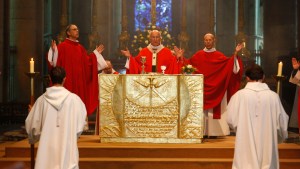When Catholics and Protestants gather together to pray the Our Father, there is typically an awkward moment when it comes to the end of the prayer. Catholics will normally stop short, while Protestants continue on with a final added sentence.
Why is that?
The Our Father prayer was taught by Jesus to his apostles and was later recorded in the Gospels. The version written in the Gospel of Matthew is the one most Christians in the English speaking world are familiar with.
Our Father, Who art in heaven,
Hallowed be Thy Name.
Thy Kingdom come.
Thy Will be done,
on earth as it is in Heaven.Give us this day our daily bread.
Matthew 6:9-13
And forgive us our trespasses,
as we forgive those who trespass against us.
And lead us not into temptation,
but deliver us from evil.
However, many Protestants add the following sentence to the end of the Our Father:
For thine is the kingdom, the power and the glory, for ever and ever.
The short answer is that this last sentence is found in some ancient Greek texts, but not all. The traditional version of the Our Father was adopted for us in the liturgy and remained unchanged for many centuries. After the Church of England broke away from the Catholic Church, they eventually adopted the “doxology” and made it part of their recitation of the Our Father.
The Catholic Encyclopedia explains, “The doxology ‘for Thine is the Kingdom’, etc., which appears in the Greek textus receptus and has been adopted in the later editions of the ‘Book of Common Prayer’ is undoubtedly an interpolation.”
Fr. William Saunders confirms this change in an article he wrote for the Arlington Catholic Herald, “During the reign of Elizabeth I and a resurgence to rid the Church of England from any Catholic vestiges, the Lord’s Prayer was changed to include the doxology, and this version became the standard for English-speaking Protestants..”
After the Second Vatican Council, the doxology was added into the Roman Catholic Mass, though not directly after the Our Father to note that while it is found in some ancient Greek texts, it is not found in the earliest versions of the Gospels.


